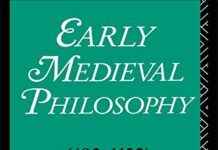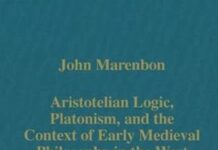
Ebook Info
- Published: 2006
- Number of pages: 466 pages
- Format: PDF
- File Size: 1.45 MB
- Authors: John Marenbon
Description
This new introduction replaces Marenbon’s best-selling editions Early Medieval Philosophy (1983) and Later Medieval Philosophy (1987) to present a single authoritative and comprehensive study of the period. It gives a lucid and engaging account of the history of philosophy in the Middle Ages, discussing the main writers and ideas, the social and intellectual contexts, and the important concepts used in medieval philosophy. Medieval Philosophy gives a chronological account which:treats all four main traditions of philosophy that stem from the Greek heritage of late antiquity: Greek Christian philosophy, Latin philosophy, Arabic philosophy and Jewish philosophy provides a series of ‘study’ sections for close attention to arguments and shorter ‘interludes’ that point to the wider questions of the intellectual context combines philosophical analysis with historical background includes a helpful detailed guide to further reading and an extensive bibliography All students of medieval philosophy, medieval history, theology or religion will find this necessary reading.
User’s Reviews
Reviews from Amazon users which were colected at the time this book was published on the website:
⭐For many years Armand Maurer’s Medieval Philosophy: An Introduction (Second Edition; Toronto: Pontifical Institute of Medieval Studies, 1982) was the standard single-volume introduction to medieval philosophy intended for advanced undergraduates and first year graduate students. It was fresh and stimulating as well as scholarly and deeply incisive in its assessment of the major philosophical figures of the middle ages. When Marenbon’s edition first appeared in 2007 it was quick to supplant Maurer’s work, both in its scope (Marenbon is well known for his “long middle ages” view) and in its attention to the historical and cultural backdrop informing the philosophical developments of the period. Moreover, its massive bibliography and guide to further reading is an invaluable addition to a textbook of this sort. Easily affordable in paper at just $35 it will be an essential text for anyone teaching medieval philosophy.
⭐This is a superb introduction to the medieval philosophical period. One very nice element in it is its coverage of many Jewish and Islamic thinkers not always discussed in standard histories. But the merit of this book goes well beyond that. It is immensely learned and thoughtful, a delight to read, and the bibliography alone, which is massive, is worth more than the price of the book. I have taught and read in this area for my entire teaching career, and i have read nothing better.
⭐Great book, well organized. Enjoyed reading it.
⭐This book has much to offer those who would like to patch up the Medieval shaped hole in most undergraduate philosophy programs. Marenbon’s account does not only relate the progression of ideas in historical context, but at points divulges into various medieval philosophical speculations (in the work these are called “Interludes” and “Studies”) while resting these discussions upon fresh bibliographies of primary and secondary works. The content of these “studies” and “interludes” serve as short introductions into very specific topics in medieval philosophy and also season the work with texture. Yet their connection to the “Further reading” and bibliographic information in the back of the book is what makes these interruptions most handy.The scope of the book is very broad. Marenbon aggrandizes medieval philosophy beyond his previous formulations (now of which are 20 years old). The medieval period begins with the advent of platonic Christian theology (C. 200) and ends in the Enlightenment (c. 1700). Not only so, but medieval philosophy bursts out of the Christian seams of previous limitations, and instead is contextualized with Muslim and Jewish philosophy in long and important chapters. Unfortunately, Marenbon never completely assesses his broad range, and concludes his work at the year 1400.Marenbon’s introduction is a great place to embark on a study of medieval philosophy, however it is not lacking challenges for the industrious reader. I found the challenge to be not running down all the interesting paths Marenbon uncovers.
⭐For now, I put it three stars. This is because the text is very difficult to read. The book could be reduced by 100 pages if Marenbon’s would shorten his sentences. Most sentences could be twice as short and convey as much information, but be of course much clearer. I am only in the first chapter of the book, and could give countless examples of this, but here is one:”‘Metaphysics’ was not Aristotle’s own name for the text (or, rather, the set of material, not all of which belongs together) by him which goes under that name.”instead of more simply saying:”‘Metaphysics’ was not Aristotle’s name for the text (or the set of material, not all of which belonging together).”The text has almost as many comas as it has letter, and has too many adverbs such as “yet”, “rather”, etc.I understand that adverbs and comas are useful, and are meant to clarify a text, but in Marenbon’s case, they make it much more difficult.
⭐A very helpful book.
⭐I read this book because it was on the further reading list in Cantor’s “The Civilization of the Middle Ages”, which I read to begin a personal study of the middle ages. Marenbon’s book did not contribute to my understanding of this period in time. While this book may be a very good exposition of medieval philosophy, its contents were not of interest to me, hence I cannot give it a good review.I want to learn about how and why medieval society functioned the way it did, how certain ideas influenced progress (or lack thereof), and so forth. Perhaps one could extrapolate from the information in Marenbon’s book how philosophy did so; certainly he himself never suggests things along the line of “because of ideas X and Y, so and so led to certain developments in society”. I also feel that the book is quite inaccessible to a reader without prior study and knowledge of philosophy (logic) in general, in the sense that such a reader will have to dwell quite a lot on the philosophical terminology and technicalities introduced.Throughout the book I felt that the focus was on logic and grammar; there is virtually no information on philosophy of ethics and on how society should function, especially in comparison with the large amount of information about logic and grammar. Perhaps my expectations on the book were unwarranted, nevertheless I did not find it enlightening in any respect, I detested reading it, and would not recommend it to anyone who’s not specifically interested in philosophy, or rather as I said, logic and grammar.
Keywords
Free Download Medieval Philosophy: An Historical and Philosophical Introduction (Routledge History of Philosophy) 1st Edition in PDF format
Medieval Philosophy: An Historical and Philosophical Introduction (Routledge History of Philosophy) 1st Edition PDF Free Download
Download Medieval Philosophy: An Historical and Philosophical Introduction (Routledge History of Philosophy) 1st Edition 2006 PDF Free
Medieval Philosophy: An Historical and Philosophical Introduction (Routledge History of Philosophy) 1st Edition 2006 PDF Free Download
Download Medieval Philosophy: An Historical and Philosophical Introduction (Routledge History of Philosophy) 1st Edition PDF
Free Download Ebook Medieval Philosophy: An Historical and Philosophical Introduction (Routledge History of Philosophy) 1st Edition





